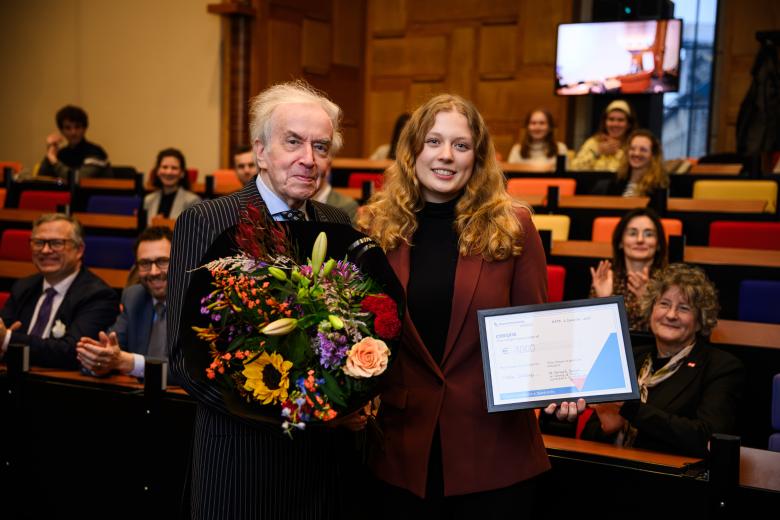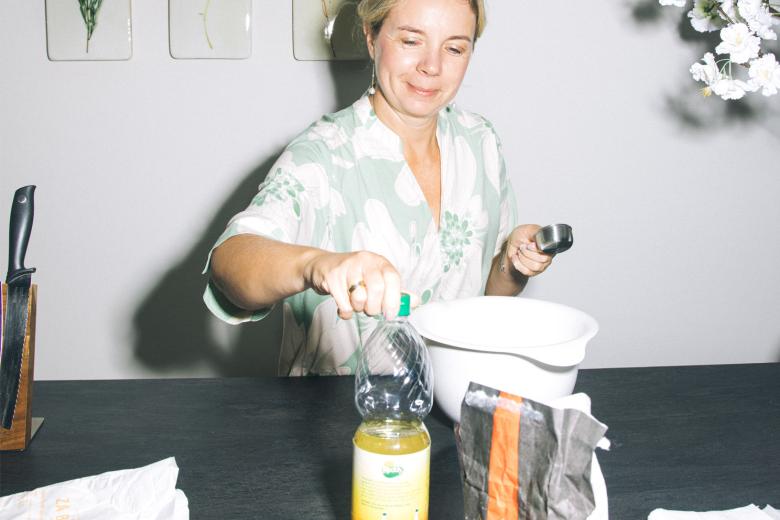“Anyone can shout from the sidelines”
Sjoerd Maillé holds a bachelor’s in Law and a master’s in Law & Labour (cum laude) from Maastricht University. Born and raised in Brabant, he now works as a trainee at the Limburg District Court. At just 24 years old, he is also the second youngest member of the Limburg Provincial Council and a citizen councillor in Maastricht. It’s the start of a very promising career, in spite of his disability: Maillé is almost blind.
Stargardt’s disease, a form of juvenile macular degeneration, is a serious eye defect that affects vision from a young age. “According to the doctors’ definitions, I’m blind,” Sjoerd Maillé says cheerfully. “When I was seven, my vision suddenly deteriorated. It got worse and worse and now I see about 5% of what others see. It’s a progressive disease, but since it’s been stable for 15 years, I don’t expect my vision to deteriorate further. People are sometimes shocked, but to be honest, it doesn’t bother me that much. I occasionally run into things, but otherwise I function perfectly well. I can live with it just fine.”
Inclusion
One thing is clear: Maillé is not one to sit around feeling sorry for himself. However, he is committed to promoting inclusion—especially for people with disabilities—both legally and politically. “And not only for people with a physical disability. I think everyone should have the opportunity to organise their own lives, regardless of gender, sexual orientation, background or disability. In my ideal world, the differences between people no longer hold us back. That’s why I became politically active. Anyone can shout from the sidelines—I want to make a concrete contribution.”
Maillé grew up in Esbeek, a village in North Brabant. “A very sheltered environment. From the moment I was diagnosed, I received a lot of help. I was able to stay at my own small primary school instead of switching to a special school. Everyone adapted to me, and I adapted to them. I learnt Braille together with the teachers, special books and aids were arranged for me. I kept going to gym class; actually I took part in all activities. I wasn’t an outsider.”
Digitisation
He felt included, too, at high school in Tilburg, which he finished in six years. “It wasn’t easy, but again, I got all the help I needed. An extra-large laptop, and a separate computer with speech and magnifying software and a Braille display to read books digitally. All in all, I passed easily, although the final exams were an ordeal. I was given extra exam time: six hours per exam instead of three. Fortunately, a lot of material was digitised during my high school years, and the computers have improved a lot. I’m no longer dependent on Braille. Without digitisation, higher education would have been difficult.”
Problem-based
Law appealed to him because he wanted to study something that made a contribution to society. He chose Maastricht because his girlfriend had been admitted to Medicine here. “And because of Problem-Based Learning. Of course, I learnt early on to stand up for myself, to solve practical challenges. But despite the help and support of many people, I believe that you have to be in the driver’s seat yourself, make your own decisions. You learn that better when you tackle a practical case in a group and view it from all angles. That’s exactly what UM stands for. I felt at home from day one, also because the university does all it can to support people with disabilities. The facilities are there, you just have to go after them yourself. Which is fine—as I said, I value independence.”
In early 2020, barely six months into his studies, corona struck. “Student life came to a virtual standstill. You studied at home, tutorials moved online. Partly out of boredom, I started to delve into local politics. One thing led to another: I followed the council meetings and joined the VVD.”
Provincial Council member
In 2021, Maillé became a citizen councillor in Maastricht. Two years later, he stood for election to the Provincial Council in Limburg. He just missed out on a preferential seat, but within a year he was offered a place anyway. “Someone moved on to The Hague and I was able to take her spot. It was a fantastic opportunity, although I did have to figure out how to combine it with my job as a trainee at the court in Maastricht.”
Returning to Brabant is, for the time being, not on the cards. “No, I feel very connected to this region. During my studies, I became quite attached to Maastricht, with its international and inclusive university. We really have to cherish it. I also see major challenges, like students leaving after their studies because there just aren’t enough interesting jobs around. We have to devote ourselves to creating a strong and attractive economy with appealing employers and affordable housing. Of course, the Province of Limburg has a major role to play, and I’m very keen to make my political contribution to that.”
Public administration
A career in the judiciary or politics, that is the question. “Both appeal to me. I want to work at the heart of society. Which is clearly the case with the court. Though as a politician, you can change policy. I can also see myself ending up in public administration. As a mayor, maybe—who knows?”
Text: Jos Cortenraad
Photography: Harry Heuts
Also read
-
Maastricht Consulates Prize on EU Law 2025 Awarded
On 2 December, the Maastricht Consulates Prize on EU Law 2025 was awarded at the Faculty of Law of Maastricht University to Merle Sandhop.
-
“Food is for sharing”
“As a little girl, I loved food. After mealtimes I was allowed to go outside and play. But before long, my mother would find me at the neighbours’, being fed all over again.” Pamela Habibović , born in Tuzla and raised in Srebrenica, talks about the importance of food in Bosnian culture. “
-
A new wave of talent emerges from the School of Business and Economics
On Sunday, November 30, 2025, the Maastricht University School of Business and Economics (SBE) proudly celebrated the achievements of over 1,461 graduates from both bachelor’s and master’s programs. The festive ceremony took place at the MECC Maastricht and marked a significant milestone for the SBE